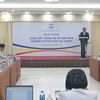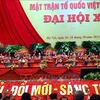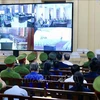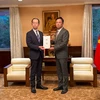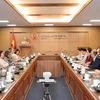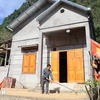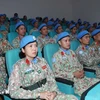Many provincial general hospitals have successfully adopted advanced techniques learnt from major Ho Chi Minh City hospitals in the two years since a programme for the purpose got underway.
The first phase of the programme aimed at improving the diagnostic and treatment capacity of provincial-level hospitals began in 2013, said Nguyen Tan Binh, director of the municipal Department of Health.
In the south, six major hospitals in HCM City have been entrusted with providing training and transferring medical techniques to 14 hospitals in southern provinces.
The Hospital for Traumatology and Orthopaedics, Gia Dinh People's Hospital, Tu Du Obstetrics Hospital, Children's Hospital No.1, Children's Hospital No.2, and Oncology Hospital have transferred 250 medical techniques in the two years.
The provincial hospitals now perform most of these techniques, Binh told a recent meeting held in HCM City.
The number of people treated at these hospitals has increased significantly, easing the overload at HCM City hospitals, he said.
A shortage of medical officials and doctors at hospitals around the Mekong Delta hindered their learning of new techniques.
While there is an average of seven doctors per 10,000 population in Vietnam, the delta has only 4.6.
Health of Minister Nguyen Thi Kim Tien said the programme would be expanded to another 13 cities and provinces that have yet to join the programme.
In all, 14 major hospitals – the other eight being in Ha Noi and Hue — have transferred to 48 hospitals across the country medical techniques in five fields in which patient demand is overwhelming, she said, listing cardiology, traumatology, oncology, obstetrics, and paediatrics.
"Teaching these techniques plays a key role in improving the quality of diagnosis and treatment at provincial hospitals and easing crowding at major hospitals."
People's Hospital 115, Binh Dan Hospital, Eye Hospital, and the Hospital of Haematology and Blood Transfusion in HCM City will be added in the second phase of the project between 2016 and 2020, according to the city Department of Health.-VNA
The first phase of the programme aimed at improving the diagnostic and treatment capacity of provincial-level hospitals began in 2013, said Nguyen Tan Binh, director of the municipal Department of Health.
In the south, six major hospitals in HCM City have been entrusted with providing training and transferring medical techniques to 14 hospitals in southern provinces.
The Hospital for Traumatology and Orthopaedics, Gia Dinh People's Hospital, Tu Du Obstetrics Hospital, Children's Hospital No.1, Children's Hospital No.2, and Oncology Hospital have transferred 250 medical techniques in the two years.
The provincial hospitals now perform most of these techniques, Binh told a recent meeting held in HCM City.
The number of people treated at these hospitals has increased significantly, easing the overload at HCM City hospitals, he said.
A shortage of medical officials and doctors at hospitals around the Mekong Delta hindered their learning of new techniques.
While there is an average of seven doctors per 10,000 population in Vietnam, the delta has only 4.6.
Health of Minister Nguyen Thi Kim Tien said the programme would be expanded to another 13 cities and provinces that have yet to join the programme.
In all, 14 major hospitals – the other eight being in Ha Noi and Hue — have transferred to 48 hospitals across the country medical techniques in five fields in which patient demand is overwhelming, she said, listing cardiology, traumatology, oncology, obstetrics, and paediatrics.
"Teaching these techniques plays a key role in improving the quality of diagnosis and treatment at provincial hospitals and easing crowding at major hospitals."
People's Hospital 115, Binh Dan Hospital, Eye Hospital, and the Hospital of Haematology and Blood Transfusion in HCM City will be added in the second phase of the project between 2016 and 2020, according to the city Department of Health.-VNA
